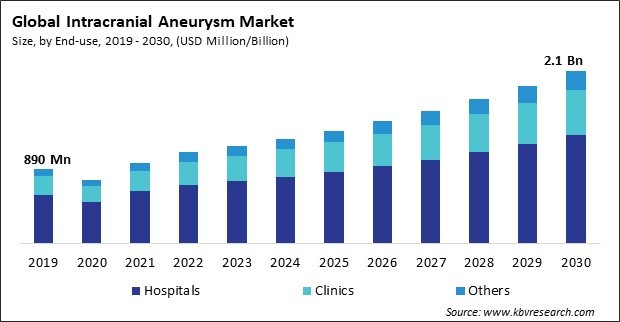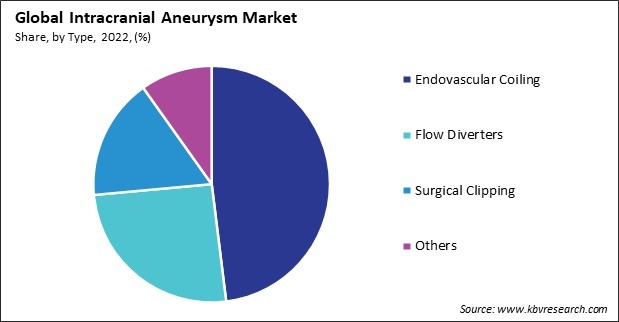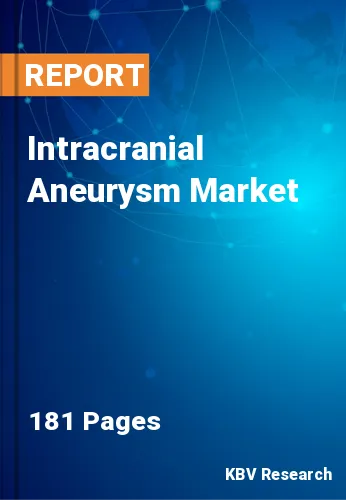“Global Intracranial Aneurysm Market to reach a market value of USD 2.1 Billion by 2030 growing at a CAGR of 8.5%”
The Global Intracranial Aneurysm Market size is expected to reach $2.1 billion by 2030, rising at a market growth of 8.5% CAGR during the forecast period.
The Asia Pacific region is experiencing significant demographic changes, including population growth, aging, and urbanization. As the population ages, the prevalence of these aneurysms, which increases with age, is also rising. Consequently, the Asia pacific region would acquire nearly 25% of the total market share by 2030. Moreover, rapid urbanization and lifestyle changes contribute to the adoption of risk factors such as smoking, hypertension, and unhealthy diet, further fueling the incidence of these aneurysms in the region.

Increased awareness about the signs, symptoms, and risk factors associated with these aneurysms encourages individuals to seek medical attention and undergo screening tests for early detection and diagnosis. Moreover, public health campaigns, educational programs, and advocacy efforts raise awareness among healthcare professionals, policymakers, and the general population about these aneurysm screening, risk reduction strategies, and early intervention options. Therefore, rising awareness and screening programs are propelling the market’s growth. Additionally, risk factors such as hypertension, smoking, atherosclerosis, and certain genetic conditions contribute to the development and progression of these aneurysms. As the prevalence of these risk factors rises globally, the incidence of these aneurysms also increases, leading to a greater demand for diagnostic, preventive, and treatment services. Additionally, the global demographic shift towards an aging population further amplifies the prevalence of risk factors for these aneurysms. Advanced age is associated with an increased likelihood of developing hypertension, atherosclerosis, and other cardiovascular risk factors that predispose individuals to aneurysm formation. Hence, the rising prevalence of risk factors propels the market’s growth.
However, the scarcity of neuro-interventional specialists, including interventional neuroradiologists and neurosurgeons trained in neurovascular procedures, restricts access to specialized diagnostic and treatment services for patients with these aneurysms. Moreover, the high demand for neuro-interventional services coupled with a limited number of specialists may result in long wait times, appointment delays, and extended time intervals between initial evaluation, diagnosis, and treatment initiation for patients with these aneurysms. Therefore, a shortage of neuro-interventional specialists is hampering the growth of the market.
Moreover, During the height of the pandemic, many healthcare facilities worldwide experienced disruptions in routine services, including elective surgeries and non-emergency procedures. As a result, patients with these aneurysms faced delays in diagnosis, treatment, and follow-up care, potentially leading to adverse outcomes and increased disease burden. Furthermore, fear of contracting COVID-19 and concerns about potential exposure in healthcare settings led many patients to delay or avoid seeking medical care, including evaluation and treatment for these aneurysms. Thus, the COVID-19 pandemic had a negative impact on the market.
Based on type, the market is divided into surgical clipping, endovascular coiling, flow diverters, and others. The flow diverters segment recorded the largest revenue share in the market in 2022. Flow diverters are highly effective in treating complex and wide-necked aneurysms. By diverting blood flow from the aneurysm sac, flow diverters promote thrombosis and subsequent occlusion, reducing the risk of rupture and long-term complications. Furthermore, flow diverters can treat a wide range of these aneurysms, including complex, fusiform, and large or giant ones in challenging anatomical locations.

On the basis of end-use, the market is segmented into hospitals, clinics, and others. In 2022, the clinics segment procured a remarkable revenue share in the market. Clinics provide convenient access to specialized care for patients with these aneurysms, particularly those seeking routine follow-up visits, diagnostic evaluations, and non-emergent consultations. Located in community settings and outpatient facilities, clinics offer shorter wait times, flexible scheduling, and closer proximity to patients’ homes, making them an attractive option for individuals seeking timely and accessible healthcare services.
Free Valuable Insights: Global Intracranial Aneurysm Market size to reach USD 2.1 Billion by 2030
Region-wise, the market is analyzed across North America, Europe, Asia Pacific, and LAMEA. The North America region witnessed the maximum revenue share in the market in 2022. North America has a relatively high prevalence of these aneurysms compared to other regions. Increased awareness among healthcare providers and the general population about the aneurysms’ risk factors, symptoms, and consequences has led to more frequent diagnosis and treatment, driving demand for related medical services and interventions.
| Report Attribute | Details |
|---|---|
| Market size value in 2022 | USD 1.1 Billion |
| Market size forecast in 2030 | USD 2.1 Billion |
| Base Year | 2022 |
| Historical Period | 2019 to 2021 |
| Forecast Period | 2023 to 2030 |
| Revenue Growth Rate | CAGR of 8.5% from 2023 to 2030 |
| Number of Pages | 181 |
| Number of Tables | 269 |
| Report coverage | Market Trends, Revenue Estimation and Forecast, Segmentation Analysis, Regional and Country Breakdown, Porter’s 5 Forces Analysis, Company Profiling, Companies Strategic Developments, SWOT Analysis, Winning Imperatives |
| Segments covered | Type, End-Use, Region |
| Country scope |
|
| Companies Included | Medtronic PLC, Stryker Corporation, MicroPort Scientific Corporation, Johnson & Johnson, MicroVention, Inc. (Terumo Corporation), B. Braun Melsungen AG, Integra LifeSciences Holdings Corporation, Delta Surgical and Penumbra, Inc. |
By End-use
By Type
By Geography
This Market size is expected to reach $2.1 billion by 2030.
Rising number of screening programs and awareness initiatives are driving the Market in coming years, however, Shortage of neuro-interventional specialists restraints the growth of the Market.
Medtronic PLC, Stryker Corporation, MicroPort Scientific Corporation, Johnson & Johnson, MicroVention, Inc. (Terumo Corporation), B. Braun Melsungen AG, Integra LifeSciences Holdings Corporation, Delta Surgical and Penumbra, Inc.
The expected CAGR of this Market is 8.5% from 2023 to 2030.
The Hospitals segment led the Market by End-use in 2022; there by, achieving a market value of $1.3 Billion by 2030.
The North America region dominated the Market by Region in 2022, and would continue to be a dominant market till 2030; there by, achieving a market value of $713.6 Million by 2030.
Our team of dedicated experts can provide you with attractive expansion opportunities for your business.

 Drivers
Drivers
 Restraints
Restraints
 Opportunities
Opportunities
 Challenges
Challenges
